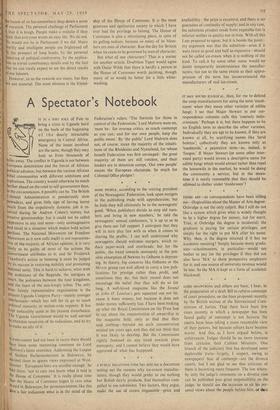A Spectator's Notebook
IT IS A WRY JOKE Of Fate to bring a crisis in Uganda hard on the heels of the beginning of the dourly intractable emergency in Central Africa. None of the issues involved are the same, though they may look so from thousands of miles away. The conflict in Uganda is not between European domination and the forces of African political advance, but between the various African tribal communities with different ambitions and kr>irations. The country would otherwise be much farther ahead on the road to self-government than, In the circumstances, it possibly can be. The British olonial Administration is ponderously slow nowadays, and gives little sign of having learnt inuch from the impulsively dynamic jolt it re- ceived during Sir Andrew Cohen's stormy but creative governorship; but it could not be called ()PPressive in any real sense—only unimaginative and timid in a situation which makes bold action Perilous. The National Movement (or Freedom Movement as it now calls itself) is not representa- tive of the majority of African opinion; it is very likely to be guilty of most of the actions the Government attributes to it; and Sir Frederick rawford's action in banning it must be judged hY its success in restoring stability and promoting national unity. This is hard,to achieve, what with the ambitions of the Baganda, the intrigues at court, the jealoysies between the four kingdoms, and the fears of the non-kingly tribes. The only even faintly representative organisation is the Present Uganda Congress Party—mainly younger intellectuals—which has still far to go to reach Political maturity or nation-wide support. It has keht noticeably quiet in the present disturbance. he Uganda Government would be well advised to abandon suspicion of its radicalism, and to try to make an ally of it.














































 Previous page
Previous page